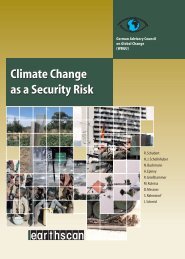Adaptation of water resources management to climate change
Adaptation of water resources management to climate change
Adaptation of water resources management to climate change
You also want an ePaper? Increase the reach of your titles
YUMPU automatically turns print PDFs into web optimized ePapers that Google loves.
Chapter 1Waking Up <strong>to</strong> Climate Change“The evidence shows that <strong>climate</strong> <strong>change</strong> is occurring …and we cannot wait any longer <strong>to</strong>take action,” declared UN Secretary-General K<strong>of</strong>i Annan in a speech <strong>to</strong> American college studentsback in May 2001. Almost every day, it seems that we hear further evidence that the Earth's <strong>climate</strong>is changing. The 1990s was the warmest decade in the last hundred years, and 1998 was thewarmest year on record. During the past century, global temperatures climbed by about 0.5°C –the largest increase in at least one thousand years. 1 As a result, snow cover is decreasing, glaciersare retreating, lakes and rivers are warming, rainfall patterns are changing and El Niño episodesare occurring more <strong>of</strong>ten. Extreme weather, including thunders<strong>to</strong>rms, flash floods, and droughts,are becoming more frequent and severe in many areas <strong>of</strong> the world. The diminishing Arctic seaiceand rising sea levels further contribute <strong>to</strong> global distress. These <strong>change</strong>s are causing biologicalsystems <strong>to</strong> alter, affecting the range, distribution and population density <strong>of</strong> a multitude <strong>of</strong> plantsand animals around the globe. Whether the <strong>to</strong>pic is polar bears or poplar trees, there is nowcompelling evidence <strong>of</strong> a world that is starting <strong>to</strong> warm up.For many <strong>water</strong> pr<strong>of</strong>essionals, however, the onset <strong>of</strong> a warming world is not considered a realproblem. Many <strong>of</strong> the public debates on <strong>climate</strong> <strong>change</strong> have left the impression that the scienceis unclear and that the causes and effects <strong>of</strong> <strong>climate</strong> <strong>change</strong> are still in doubt. In addition, therehave been few serious attempts <strong>to</strong> inform <strong>water</strong> experts about the links between <strong>climate</strong> <strong>change</strong>and the <strong>water</strong> sec<strong>to</strong>r. Under such circumstances, it is hardly surprising that the <strong>water</strong> sec<strong>to</strong>r hasso far paid little attention <strong>to</strong> <strong>climate</strong> <strong>change</strong>, preferring for the most part <strong>to</strong> focus on other issuesthat must seem far more pressing. Although quite understandable, continuing <strong>to</strong> ignore orunderestimate <strong>climate</strong> <strong>change</strong> and its impact on the <strong>water</strong> sec<strong>to</strong>r would be a mistake.In the first place, the science <strong>of</strong> <strong>climate</strong> <strong>change</strong> is now anything but unclear about whatdirection we are heading. While models might differ in projecting the rate and magnitude <strong>of</strong>warming, all <strong>of</strong> them project a warming <strong>of</strong> the Earth's <strong>climate</strong>, and all forecast significant <strong>change</strong>sin <strong>water</strong> quantity and quality and in the ecological character <strong>of</strong> ecosystems around the world.Though there are still some processes such as the role <strong>of</strong> clouds and <strong>water</strong> vapour that vex <strong>climate</strong>experts, the last fifteen years <strong>of</strong> research and modelling has revealed a great deal about how the<strong>climate</strong> system operates and the key fac<strong>to</strong>rs that drive it <strong>to</strong> <strong>change</strong>. The original trickle <strong>of</strong> evidencehas now become a flood. Further, though a small number <strong>of</strong> scientists contest the conclusions <strong>of</strong><strong>climate</strong> <strong>change</strong> research, the vast majority agree that the Earth's <strong>climate</strong> is changing and thatmuch <strong>of</strong> the <strong>change</strong> can be attributed <strong>to</strong> human activities 2,1 .“THE ORIGINAL TRICKLE OF EVIDENCE HAS NOWBECOME A FLOOD.”“So <strong>climate</strong> <strong>change</strong> is a problem, but it is probably not an urgent one” might be the reply <strong>of</strong>a sceptical <strong>water</strong> pr<strong>of</strong>essional. He/she would point out, quite correctly, that the most dramatic1


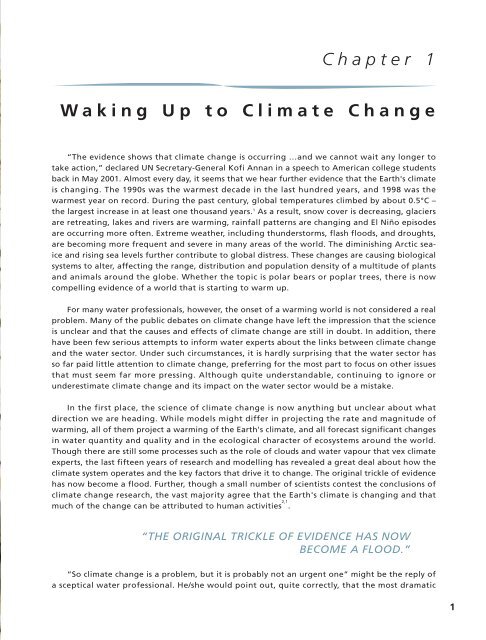
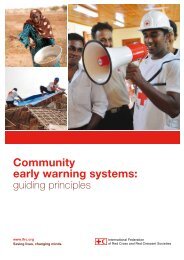
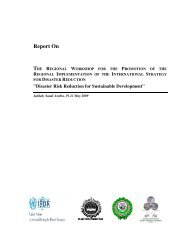
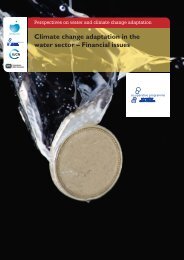

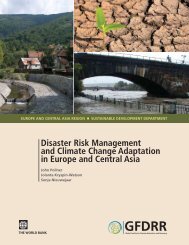
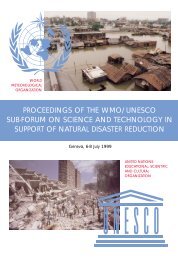


![View full document [PDF 988.55 KB] - PreventionWeb](https://img.yumpu.com/47733942/1/184x260/view-full-document-pdf-98855-kb-preventionweb.jpg?quality=85)
![View full document (in French) [PDF 4.96 MB] - PreventionWeb](https://img.yumpu.com/47223870/1/184x260/view-full-document-in-french-pdf-496-mb-preventionweb.jpg?quality=85)

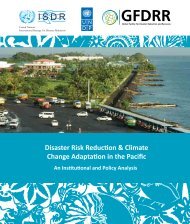
![View full document [PDF 25.02 MB] - PreventionWeb](https://img.yumpu.com/44204570/1/190x234/view-full-document-pdf-2502-mb-preventionweb.jpg?quality=85)
